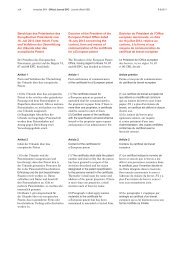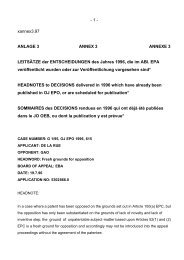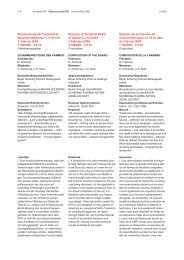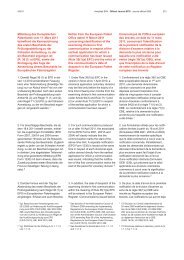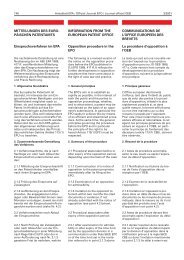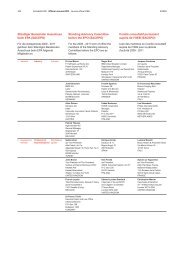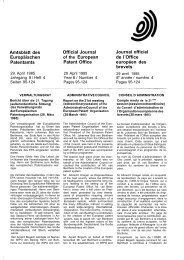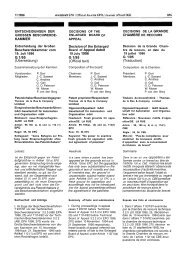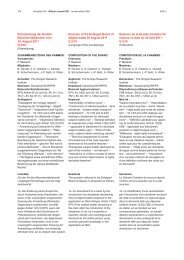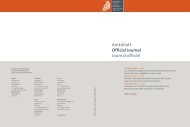Entscheidung der Großen Beschwerdekammer vom 23. Juli 2012 G ...
Entscheidung der Großen Beschwerdekammer vom 23. Juli 2012 G ...
Entscheidung der Großen Beschwerdekammer vom 23. Juli 2012 G ...
Create successful ePaper yourself
Turn your PDF publications into a flip-book with our unique Google optimized e-Paper software.
4/2013 Amtsblatt EPA Official Journal EPO Journal officiel OEB 201<br />
sichtigt werden, solange dieses Verfahren<br />
anhängig sei. Danach komme<br />
nur noch eine Berichtigung nach<br />
Regel 140 EPÜ in Betracht, und von<br />
dieser Regel, die keine ausdrückliche<br />
Frist setze, machten die Anmel<strong>der</strong><br />
häufig Gebrauch, um die Berichtigung<br />
offenbarer Unrichtigkeiten zu beantragen,<br />
wenn dies nach Regel 139 EPÜ<br />
nicht mehr möglich sei.<br />
3. Nach <strong>der</strong> <strong>der</strong>zeitigen erstinstanzlichen<br />
Praxis müsse ein Antrag nach<br />
Regel 140 EPÜ nicht während eines<br />
anhängigen Verfahrens gestellt werden,<br />
man könne ihn auch nach <strong>der</strong> Erteilung<br />
des Patents stellen und ihm könne<br />
je<strong>der</strong>zeit stattgegeben werden, auch<br />
nach Beginn und sogar nach Abschluss<br />
des Einspruchsverfahrens. Überschreite<br />
die Prüfungsabteilung die durch<br />
Regel 140 EPÜ vorgegebenen Grenzen,<br />
so könnte das Fehlen einer Frist erhebliche<br />
Probleme bereiten, nicht nur, wenn<br />
<strong>der</strong> Berichtigungsantrag im Einspruchverfahren<br />
gestellt werde, son<strong>der</strong>n auch,<br />
wenn er nach Ablauf <strong>der</strong> Einspruchsfrist<br />
gestellt werde. In diesem Fall gebe es<br />
keine Handhabe, um zu prüfen, ob die<br />
Berichtigung sich innerhalb <strong>der</strong> immanenten<br />
Grenzen <strong>der</strong> Regel 140 EPÜ<br />
bewege; Dritte verfügten dann unter<br />
bestimmten Umständen über kein angemessenes<br />
Rechtsmittel mehr und müssten<br />
in an<strong>der</strong>en Fällen auf das nationale<br />
Nichtigkeitsverfahren ausweichen, was<br />
umständlich wäre. Eine Frist würde<br />
daher Rechtssicherheit und Schutz für<br />
Dritte bieten, ohne dass dadurch das<br />
Recht (und die Pflicht) <strong>der</strong> Patentinhaber<br />
nach Regel 71 (3) EPÜ geschmälert<br />
würde, ihr Einverständnis mit <strong>der</strong> für die<br />
Erteilung vorgesehenen Fassung zu<br />
erklären.<br />
4. Nach <strong>der</strong> <strong>der</strong>zeitigen Praxis (gemäß<br />
T 79/07 <strong>vom</strong> 24. Juni 2008) werde, wenn<br />
während eines anhängigen Einspruchsverfahrens<br />
ein Antrag auf Berichtigung<br />
nach Regel 140 EPÜ gestellt werde, das<br />
Einspruchsverfahren ausgesetzt und die<br />
Sache an die Prüfungsabteilung zurückverwiesen;<br />
es werde erst wie<strong>der</strong> aufgenommen,<br />
wenn die Prüfungsabteilung<br />
eine endgültige <strong>Entscheidung</strong> getroffen<br />
habe. Da <strong>der</strong> berichtigte Erteilungsbe-<br />
Thereafter, only a correction un<strong>der</strong><br />
Rule 140 EPC can be consi<strong>der</strong>ed and<br />
applicants often turn to Rule 140 EPC<br />
which has no express time limit to<br />
request the correction of obvious errors<br />
when this is no longer possible un<strong>der</strong><br />
Rule 139 EPC.<br />
3. Un<strong>der</strong> current first instance practice,<br />
a request un<strong>der</strong> Rule 140 EPC need not<br />
be filed during pending proceedings,<br />
may be filed after the grant of a patent<br />
and may be allowed at any time,<br />
including after the initiation and even<br />
termination of opposition proceedings.<br />
If the examining division exceeded the<br />
limits of Rule 140 EPC, the non-existence<br />
of a time limit might cause consi<strong>der</strong>able<br />
problems, not only if a request<br />
for correction is filed during opposition<br />
proceedings but also if filed after expiry<br />
of the opposition period. In such a case,<br />
there would be no means of verifying<br />
that the correction fell within the inherent<br />
limits of Rule 140 EPC; third parties<br />
would be left, in certain circumstances,<br />
without an appropriate legal remedy<br />
and, in other cases, they would have to<br />
resort to national revocation proceedings<br />
which could be cumbersome. A time limit<br />
would thus provide legal certainty and<br />
the protection of third parties, while the<br />
interests of patent proprietors would not<br />
be prejudiced in view of their right, and<br />
duty, to agree the text of patents to be<br />
granted un<strong>der</strong> Rule 71(3) EPC.<br />
4. Un<strong>der</strong> current practice (following<br />
T 79/07 of 24 June 2008), if a request<br />
for correction un<strong>der</strong> Rule 140 EPC is<br />
filed when opposition proceedings are<br />
pending, these are suspended while the<br />
case is remitted to the examining division<br />
and only resumed after a final decision<br />
of the examining division. Since the<br />
retroactive effect means a corrected<br />
grant decision keeps its original date,<br />
the public is informed of the correction<br />
d'examen ne peuvent être examinées<br />
que dans la mesure où cette procédure<br />
est en instance. Par la suite, seule une<br />
rectification au titre de la règle 140 CBE<br />
peut être envisagée, et les demandeurs<br />
invoquent souvent cette règle,<br />
qui ne prévoit aucun délai exprès pour<br />
requérir la rectification d'erreurs manifestes<br />
lorsqu'une requête au titre de la<br />
règle 139 CBE n'est plus possible.<br />
3. Conformément à la pratique suivie<br />
actuellement en première instance, il<br />
n'est pas nécessaire qu'une procédure<br />
soit pendante pour qu'une requête<br />
puisse être présentée au titre de la<br />
règle 140 CBE ; une telle requête peut<br />
ainsi être déposée après la délivrance<br />
d'un brevet et être admise à tout<br />
moment, y compris après qu'une<br />
procédure d'opposition a été engagée<br />
et même après la clôture de cette<br />
procédure. Si la division d'examen<br />
outrepassait les limites fixées par la<br />
règle 140 CBE, l'absence de délai pourrait<br />
entraîner des problèmes considérables<br />
si une requête en rectification était<br />
présentée non seulement pendant la<br />
procédure d'opposition mais également<br />
après l'expiration du délai d'opposition.<br />
Dans un tel cas, il n'y aurait aucun<br />
moyen de vérifier que la rectification<br />
s'inscrit dans les limites intrinsèques<br />
de la règle 140 CBE ; dans certaines<br />
circonstances, les tiers se retrouveraient<br />
sans voie de recours appropriée et, dans<br />
d'autres cas, ils devraient engager des<br />
actions nationales en nullité, qui pourraient<br />
s'avérer lourdes. Un délai serait<br />
par conséquent garant de la sécurité<br />
juridique et de la protection des tiers,<br />
tandis que les intérêts des titulaires de<br />
brevet ne seraient pas lésés puisque<br />
ceux-ci ont le droit, et l'obligation, de<br />
donner leur accord sur le texte dans<br />
lequel il est envisagé de délivrer le<br />
brevet, conformément à la règle 71(3) CBE.<br />
4. Conformément à la pratique actuelle<br />
(suite à la décision T 79/07 du 24 juin<br />
2008), si une requête en rectification au<br />
titre de la règle 140 CBE est présentée<br />
alors qu'une procédure d'opposition est<br />
en instance, celle-ci est suspendue<br />
pendant que l'affaire est renvoyée à la<br />
division d'examen, et elle ne reprend que<br />
lorsque la division d'examen a statué de<br />
manière définitive. L'effet rétroactif ayant<br />
pour conséquence que la décision de



